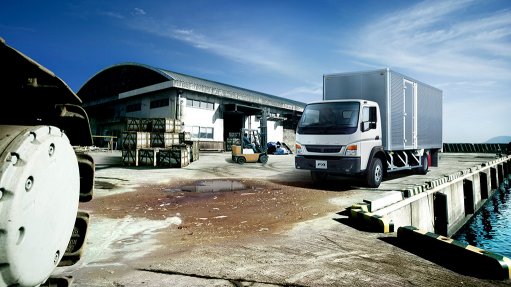
The FA 9-137
Fuso Trucks Southern Africa (FTSA) has imported its first truck model from India, with more to follow.
Locally, FTSA forms part of Daimler Trucks South Africa, which is part of Mercedes-Benz South Africa (MBSA), with the company also a division of the global Daimler Trucks & Buses group.
Despite the fact that MBSA has a truck and bus assembly plant in East London, in the Eastern Cape, FTSA’s newcomer will not be assembled locally, but imported as a fully built-up unit, says Daimler Trucks South Africa executive director Kobus van Zyl.
South African truck distributors currently pay no import duties if they assemble their vehicles on a semi-knockdown basis.
Despite this, the better value option is to import the Fuso FA 9-137 as a fully built-up unit.
South Africa has seen a surge in vehicle imports from India in recent years, especially in the entry-level passenger car segment.
The FA 9-137 will compete in the light to medium-duty truck segment, and should find particular appeal in the distribution market and as a small tipper, says FTSA head Naeem Hassim.
The vehicle will fit in between the current Canter and Fighter models, at 9.6 t gross vehicle mass, with a 5 t payload.
The FA 9-137 comes from Daimler India Commercial Vehicles’ (DICV’s) new 176 000 m2 plant in Chennai, India.
The vehicle is based on the Fuso Canter light-duty truck and incorporates a newly developed 4D37 diesel engine. It utilises a six-speed manual transmission.
The truck is sold under the Bharat Benz brand in India, but exported as a Fuso.
Fuso is known as a Japanese brand.
DICV currently exports Fuso trucks to Asia and Africa, with the Middle East and South America to follow.
With South Africa’s dirty fuel – and the push for cleaner fuel in limbo as government and oil refineries seek a funding mechanism for the required upgrades – will MBSA increasingly import trucks from developing markets, rather than Europe and Japan where engine development seems focused on meeting those regions’ more strict emission standards?
South Africa requires Euro II emission standards, while Europe already operates on Euro VI standards.
Van Zyl says Daimler’s German head office will continue to work on “developing answers” for developing markets, where emission standards are often less demanding.
He says Daimler Trucks & Buses is well aware of the product gap that exists between developed and developing countries.
This said, FTSA is likely to see its future heavy trucks come from India, with extra-heavy trucks to come from Japan and India. The Canter will, however, still come from Japan.
“Sourcing from Japan provides us with more model options,” notes Hassim. “This is important as we are looking at expanding our model line-up.”
FLAT LOCAL TRUCK MARKET
Looking at the South African truck market, Van Zyl expects sales to be “down or flat” compared with last year’s 31 500 units.
While the second half of the local market is traditionally stronger than the first half, it is unlikely to be the case this year, he adds.
Sales are also expected to remain flat next year.
As to when MBSA will again report detailed monthly new vehicle sales, Van Zyl notes that the group will only do so if the Department of Trade and Industry takes ownership of the local automotive industry’s numbers, issuing “all the data on a free, publicly available basis”.
MBSA currently declines providing numbers, in fear of potential legal repercussions regarding uncompetitive behaviour, says Van Zyl.
South Africa’s new vehicle sales numbers are compiled by the private sector, and published by the Department of Trade and Industry, among others.
MBSA is one of a handful of vehicle manufacturers which do not provide detailed sales reports.